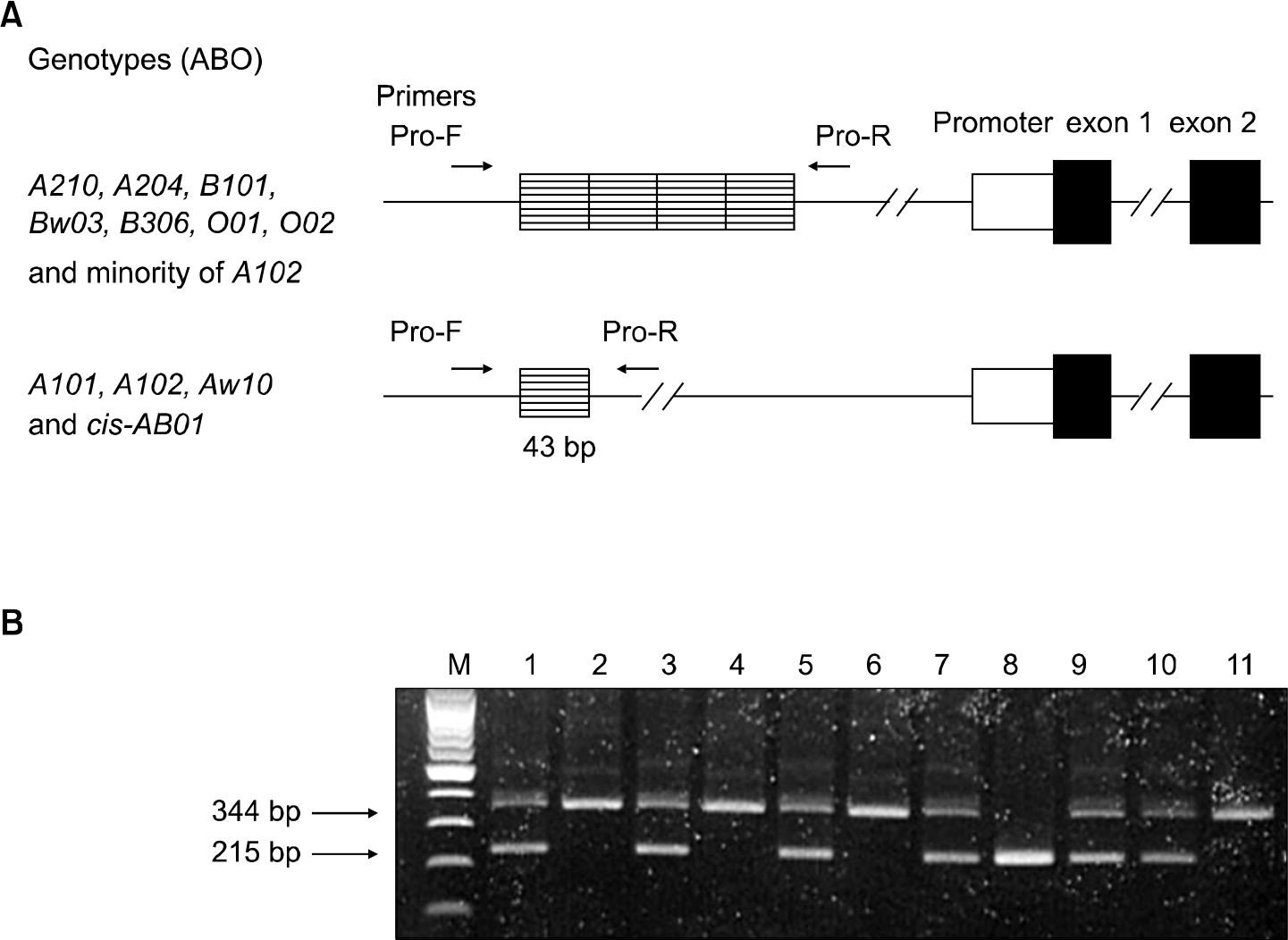Korean J Hematol.
2009 Sep;44(3):127-132. 10.5045/kjh.2009.44.3.127.
Allele-related Variation in Minisatellite Repeats Involved in Transcription of the ABO Gene in Korean Blood Donors
- Affiliations
-
- 1Department of Laboratory Medicine, Chonnam National University Medical School, Gwangju, Korea. spsuh@chonnam.ac.kr
- KMID: 2252129
- DOI: http://doi.org/10.5045/kjh.2009.44.3.127
Abstract
-
BACKGROUND: The CBF/NF-Y enhancer region of ABO gene reported to contain 43bp minisatellite tandem repeats has been rarely reported. We describe here the relationship between minisatellite tandem repeats and ABO alleles in samples from Korean population with common ABO blood group and rare ABO subgroup.
METHODS
Sixty one cases of ABO subgroup (14 A2, 12 A2B, 1 Aweak, 7 AweakB, 11 B3, 5 A1B3, 1 A1Bweak, 2 Bweak, and 8 cis-AB) and 41 cases of common ABO blood group (13 A, 6 AB, 11 B, and 11 O) were obtained from healthy donors at the Gwangju-Chonnam Red Cross Blood Center between Sep 2004 and Aug 2005. Red cells were phenotyped by standard serologic tests and genotyped by direct DNA sequencing exon 6 and 7 of the ABO gene. The minisatellite repeats were analyzed by PCR method.
RESULTS
The ABO*A101 and *A102 had only one repeat, *B101, *O01 and *O02 had 4 repeats in common ABO blood group, while the *A102, *cis-AB01, and *Aw10 had only one minisatellite repeat and *A201, *A204, *B101, *Bw03, *B306, *O01, and *O02 alleles had 4 repeats and unexpectedly 3 A2 cases with *A102 had 4 repeats in the rare ABO subgroup.
CONCLUSION
The minisatellite repeats found in Koreans correlate well with ABO alleles in sample common ABO phenotype, but do not completely correlate with those of ABO subgroup. We revealed here a pattern of the minisatellite repeats in various ABO subgroup in Korea.
MeSH Terms
Figure
Reference
-
References
1. Landsteiner K. Ueber agglutinationserscheinungen normalen menschlichen blutes. Zentralbl Bakteriol. 1990; 27:357–63.2. Yamamoto F, Clausen H, White T, Marken J, Hako-mori S. Molecular genetic basis of the histo-blood group ABO system. Nature. 1990; 345:229–33.
Article3. Seltsam A, Hallensleben M, Kollmann A, Burkhart J, Blasczyk R. Systematic analysis of the ABO gene diversity within exons 6 and 7 by PCR screening reveals new ABO alleles. Transfusion. 2003; 43:428–39.4. Cho D, Kim SH, Ki CS, et al. A novel B(var) allele (547 G>A) demonstrates differential expression depending on the co-inherited ABO allele. Vox Sang. 2004; 87:187–9.
Article5. Cho D, Shin MG, Yazer MH, et al. The genetic and phenotypic basis of blood group a subtypes in Koreans. Transfus Med. 2005; 15:329–34.
Article6. Hosseini-Maaf B, Hellberg A, Chester MA, Olsson ML. An extensive polymerase chain reaction-allele-specific polymorphism strategy for clinical ABO blood group genotyping that avoids potential errors caused by null, subgroup, and hybrid alleles. Transfusion. 2007; 47:2110–25.
Article7. Seltsam A, Das Gupta C, Bade-Doeding C, Blasczyk R. A weak blood group A phenotype caused by a translation-initiator mutation in the ABO gene. Transfusion. 2006; 46:434–40.
Article8. Kominato Y, Tsuchiya T, Hata N, Takizawa H, Yamamoto F. Transcription of human ABO histo-blood group genes is dependent upon binding of transcription factor CBF/NF-Y to minisatellite sequence. J Biol Chem. 1997; 272:25890–8.
Article9. Irshaid NM, Chester MA, Olsson ML. Allele-related variation in minisatellite repeats involved in the transcription of the blood group ABO gene. Transfus Med. 1999; 9:219–26.
Article10. Seltsam A, Wagner FF, Grüger D, Gupta CD, Bade-doeding C, Blasczyk R. Weak blood group B phenotypes may be caused by variations in the CCAAT-binding factor/NF-Y enhancer region of the ABO gene. Transfusion. 2007; 47:2330–5.
Article11. Cooling L. ABO, H, and Lewis blood groups and structurally related antigens. Roback JD, Combs MR, Grossman BJ, Hillyer CD, editors. Technical manual. 16th ed.Bethesda, MA: American Association of Blood Banks;2006. p. 361–85.12. Kim SH, Cho D, Choi KL, et al. A case of A1B3 child from a group a mother and A group B father: new group B allele arising from 547 G>A. Korean J Blood Transfus. 2004; 15:45–50.13. Blumenfeld OO, Patnaik SK. Allelic genes of blood group antigens: a source of human mutations and cSNPs documented in the blood group antigen gene mutation database. Hum Mutat. 2004; 23:8–16.
Article14. Cho D, Kim SH, Jeon MJ, et al. The serological and genetic basis of the cis-AB blood group in Korea. Vox Sang. 2004; 87:41–3.
Article
- Full Text Links
- Actions
-
Cited
- CITED
-
- Close
- Share
- Similar articles
-
- ABO gene analysis of cis-AB and B subgroup in blood donors
- Considerations on ABO Genotyping Results: Lessons from ABO*AW.10 Allele Cases
- Analysis of Complete Exons and Flanking Introns of ABO Gene in Korean B(3) Blood Donors
- Simple ABO genotyping method using three polymorphic sites at the ABO locus
- Molecular Characteristics of B Subgroups in Koreans


